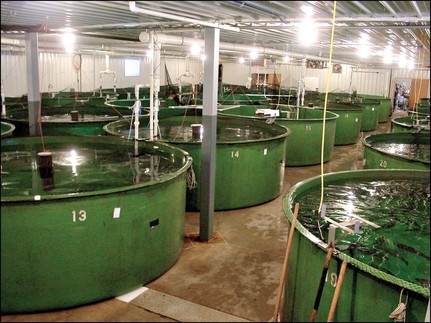
CITY HALL — The Food and Drug Administration is inching closer to approving the first genetically-modified animal for human consumption, and commercial fisherman, dietitians nor Santa Monica city officials are happy about it.
The product, which one member of Congress derided as a “Frankenfish,” is a bioengineered Atlantic salmon that has genetic material from both the Chinook salmon and a completely different variety of fish called the Ocean Pout.
It grows to market size in half the time of conventional salmon, and could be grown in on-shore facilities closer to consumer markets, which would reduce the carbon footprint of the fishing industry, according to the website of the company that created the fish, Aquabounty Technologies.
The company calls the fish the AquAdvantage Salmon.
It has the ability to provide more food in less time with, potentially, fewer resources, but Santa Monica City Councilman Terry O’Day doesn’t see much that’s advantageous about the creature.
O’Day, who’s affiliated with the non-profit Food and Water Watch, said that the new kind of salmon has huge potential to affect native species that are “already under severe strain.”
Because the AquAdvantage Salmon grows twice as fast as normal fish, if it were to make it into the wild, it could out-compete natural salmon and eventually lead to a die off.
Opponents also fear that the fish have some small chance of breeding with natural salmon, despite the fact that the company engineers them to be sterile and the FDA would require that the new fish be grown in physically contained systems.
Members of the fishing industry have three deeply held concerns about the “Frankenfish” — the impact on the salmon market, the impact on the environment and the effects that the new fish could have on the people that eat it.
“I’m not going to tell you it’s going to kill you, but I’m not going to tell you it’s safe to eat. I’m not going to tell you it’s going to destroy the environment, but I’m not going to tell you I’m comfortable letting it anywhere near our salmon,” said Dale Kelley, executive director of the Alaska Trollers Association.
Kelley’s association represents fishermen in Alaska and some in California.
Problematically, the information to make those determinations isn’t getting out.
The genetic modification is being treated like a drug, and kept mostly behind closed doors to protect patent rights, which is a problem for fishermen who feel they can’t get access to relevant facts about their own industry, Kelley said.
“The FDA is more interested in the patent rights than providing a transparent process about the food we eat,” Kelley said.
The question of whether or not the modified fish is even safe for human consumption hasn’t yet been answered, Kelley said.
“We’re concerned about consumers getting healthy food,” Kelley said. “We take great care of our product. I don’t think there’s been enough study done.”
Erin Neistat Morse, the chief clinical dietitian for both the Santa Monica-UCLA Medical Center and the UCLA Ronald Reagan Medical Center, agrees.
“There still needs to be research,” Neistat Morse said. “There doesn’t seem to be conclusive evidence one way or another.”
No long term studies have been done on the fish. In fact, some of the only research that has been conducted was done by Aquabounty Technologies, which claims the AquAdvantage Salmon is the same as natural salmon.
“This is a new species of salmon,” Neistat Morse said. “Is there any human allergy, for instance, or could it have a detrimental effect on people with food allergies. What will it do to the immune system? There are a lot of questions on some of these new fish that need answers.”
The FDA doesn’t have the responsibility to make sure that the research gets done. It only has to make the determination whether or not the product is “remarkably different” from normal salmon, Kelley said.
It’s unclear what the Santa Monica City Council can do to obstruct the path of the genetically modified fish if it makes it through Congress.
With that in mind, O’Day said, it’s critical to send a message to lawmakers now, particularly local representative Henry Waxman (D-Santa Monica).
“We have the opportunity to have great influence,” O’Day said. “We have a great leader in Henry Waxman, and as a community we should be sure to give him the support he needs to take a stance and use the power he has.”
If the new kind of salmon makes it through the FDA approval process, the next fight will be on how it’s labeled in grocery stores.
Labeling might be an even more contentious debate, but Neistat Morse hopes that whatever packaging or signage is assigned to the new fish would make it evident that it was genetically modified.
“It would be a big concern. If it’s not labeled, I’d suggest people find fish products that they know where it comes from, and research and pick products they’re comfortable with that they find to be safe,” Neistat Morse said.
ashley@www.smdp.com








